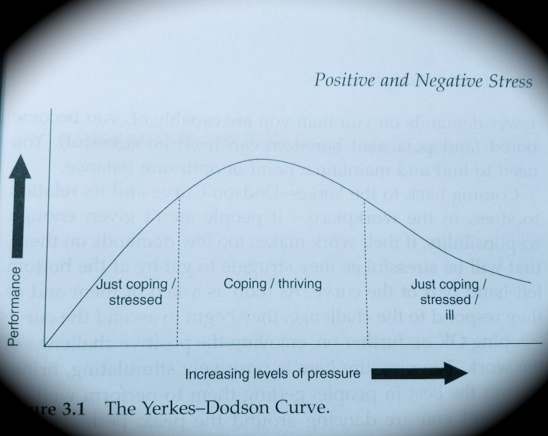Many of you will already have experienced this at some times in their lives: you are not really motivated to go to work or open your laptop. You feel not energized at all, everything seems to be taking longer than before. Whatever it is you are doing is demanding you so much less than you are capable of that you actually feel completely bored and useless. Sounds familiar? Well, let me tell you that persistent boredom is also a form of stress which – as all forms of stress over longer periods of time – can make you sick in various ways.
Not being challenged enough is one extreme of the so-called “Yerkes-Dodson Curve” which looks like a reversed U.
As we also know all too well, life nowadays is asking many of us a lot in terms of data overflow, multitasking, more and more global organizations, hence increased workload at demanding times, etc. When dealing with these sort of challenges but still being capable of handling everything, we move up the curve towards the peak. Pressure increases but so does our ability to cope with it in an effective manner.
Nevertheless, beyond a certain point, if the pressure continues to rise our performance will start to decrease. We feel less able to cope with the multitude of tasks we are to perform, details are lost in a sheer flood of information, we feel overwhelmed and unorganized. Our motivation drops and eventually, when this goes on for too long, we become sick. Obesity, burnout, depression, chronic pain, fatigue, cancer, heart disease are just a few key words to stress what an important impact stress can have on our wellbeing and our lives as a whole. Your body simply cannot cope with the permanent activation of the sympathetic nervous system… stress becomes distress.
At the peak however, when finding the right balance between personal resources and challenge, we excel. In this state you are creative and efficient and you feel very good about yourself. Usually this state is called ‘flow’.
You might be asking yourselves now: is there a way to prevent tripping over to the other side of the U? Well, yes there is! You have to find a “relaxation response”[1], that means a “(…)physical state of deep rest that counteracts the harmful effects of (your body’s) fight-or-flight response”. If you are able to do this, you might even discover a state of much higher performance than you ever would have imagined.
Mindfulness training, as a way of being present right here and now with your own thoughts, feelings and physical sensations, will certainly enable you to deal better with wherever you are on the Yerkes-Dodson Curve.
Don’t hesitate to contact me should you want to learn more about how mindfulness could help you! Jenny
Further reading:
- Planting the seeds for mindfulness
- How to get started with Mindfulness
- 4 little hints to find time for your daily mindfulness meditation
[1] Chaskalson, page 63.

